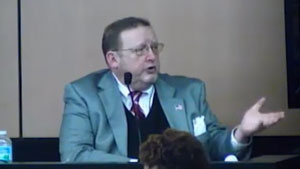

The Expert: Dr. Terrance Baker, an expert in emergency medicine and geriatrics, testifies for the plaintiff that the treating physician failed to follow the standard of care with the patient.

In a 2016 Florida medical malpractice trial, a family practice, emergency medicine and geriatric expert from Baltimore, Dr. Terrance Baker, testifies for a 74-year-old patient who claimed that a hospital physician’s negligence caused tissue damage that led to the amputation his leg below the knee.
Calling upon his experience as an emergency room physician, Baker explores clues he said would have led him to obtain specific blood tests and a Doppler ultrasound to begin working up this patient for an acute vascular occlusion. The patient, who had previously been operated upon for blockages of his heart arteries as well as a surgical bypass procedure for a blockage in one of his legs, was awakened in the early morning hours with the sudden onset of severe leg pain. Due to his previous leg surgery, he was taking a medication called Coumadin, which is commonly known as a blood thinner, but in reality acts to prevent blood from clotting. The expert states that these facts should have alerted the ER doctor to the distinct possibility of a new blockage or occlusion of the arteries in his right leg, and that possibility should have directed the ER physician to include this within her differential diagnosis, the list of things that would possibly be consistent with a history like this.
The physical examination should then have helped to include or eliminate the various possibilities within the differential diagnosis. The expert feels confident, based upon his reading of the physical evaluations previously performed by the patient’s family physician, podiatrist, and vascular surgeon, that the patient’s peripheral pulses had not been palpable for years. The nurses’ reports that morning indicated that the capillary filling was sluggish in the foot. Both of these physical findings would support the diagnosis of long-standing problems with circulation in the leg.
Additionally, the expert notes the patient suffered a recent respiratory illness, which frequently leads to poor hydration in older patients, as well as the patient complaining of a sudden onset of severe pain that awakened him and forced him to come by ambulance to the hospital. Because of these issues, Baker insists that the ER doctor should have been alerted to the distinct possibility of an acute arterial occlusion occurring on top of chronic arterial obstruction. Unfortunately, the expert testifies that this did not seem to be on the ER doctor’s radar.
Baker notes that, under the standard of care, the next step would be to obtain tests to rule in or out the likelihood of occlusion. These tests could include a Doppler ultrasound and blood testing, including a CBC, metabolic blood panel, and clotting studies to alert the treating physician to medical problems that might need to be addressed while further workup of the occlusion took place. None of this was done in this case.
Once these tests were initiated, Baker explains the standard of care would call for consultation with a vascular surgeon. The ER physician is the individual who makes the decision in a case like this to call in a vascular surgeon to further evaluate the patient. This again was not done.
Baker notes that this patient would usually have at least been admitted for observation for up to 24 hours. Once the ultrasound demonstrated an occlusion, his status would have changed to a “full admission.” This was apparently not done either. The expert estimates that the ER doctor spent as little as four minutes of “face time” with this patient, and 20 minutes maximum of total time with him.
The jury was convinced and awarded the plaintiff $275,000.
Gary Gansar, MD, is residency-trained in general surgery. He served as Chief of Surgery and Staff at Elmwood Medical Center and on the Medical Executive Committee at Touro Infirmary and Mercy Hospital in New Orleans, LA. Dr. Gansar was Board Certified in general surgery while in active practice. He joined AMFS in 2015 as a Physician Medical Director.
The medical expert witness partner for attorneys serious about building a winning case
AMFS is your trusted source for highly-qualified medical expert witnesses. After pioneering the field nearly three decades ago, we’re continuing to redefine medical expert witness services by providing value far beyond a referral alone.
Our Physician Medical Directors know what it takes to build a strong case. Our medical expert witnesses leave no doubt. And our case managers streamline billing and logistics every step of the way, letting you focus on what you do best: constructing your winning case. Explore why AMFS clients expect more from their medical expert witnesses—and get it.
